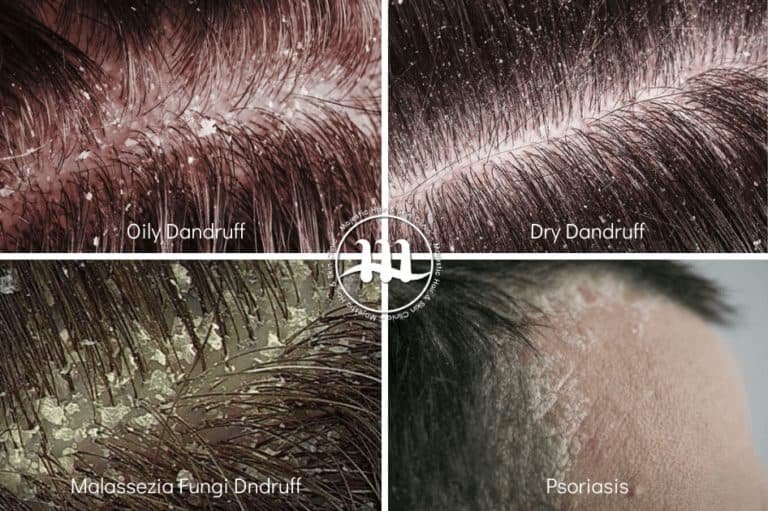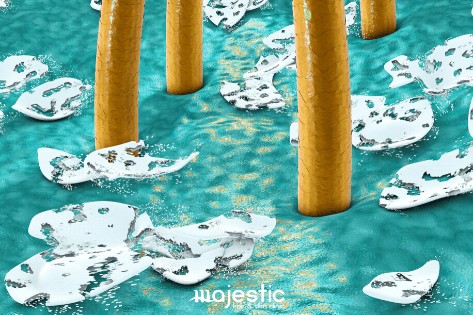What is Dandruff?
Dandruff is a widespread scalp condition and is a significant issue for millions of people all over the world. Dandruff means the white and grayish flakes in the hair that are the dead skin cells that shed on the scalp, which stay in the hair or fall off on the shoulders, face, and back. Greasy dandruff, which is also seborrheic dermatitis, is a dandruff condition in which oily yellow and white flakes clump together and stick to the hair and scalp.
Dry dandruff is a condition where dry white and loose flakes of dandruff appear in the hair because of dry skin. The problem of dandruff is prevalent in men and women all over the world and can be socially embarrassing and also can cause many skin problems. The severe dandruff can cause excessive hair loss that may lead to baldness in the log term.
The Types of Dandruff
Usually, there are four types of dandruff that human beings get and understanding the kind of dandruff will help in knowing how to prevent and get rid of the problem. The following are the four types of dandruff:

Grease or Oil Based Dandruff:
The accumulation of sebum oil on the scalp leads to oil-based dandruff in the hair. This is either a natural condition or more secretion of sebum oil when stress levels and anxiety levels rise in day to day lives.
Dry Dandruff:
Many people suffer from dryness of skin and the scalp; these causes flaky and dry dead skin cells that are dandruff.
Malassezia Fungal Dandruff:
Different types of funguses like Malassezia cause dandruff. This fungus grows on oily scalps and produces oleic acid, which makes skin cells clump and results in white flakes that is dandruff.
Dandruff Caused by Diseases:
Different types of diseases cause dandruff that includes eczema, psoriasis, and other skin-related conditions that can cause dandruff in the hair as a byproduct of the disease.
Fast Facts about Dandruff:
- There are many causes of dandruff, and most people have some amount of dandruff in their hair. It becomes a problem when it starts causing itchiness and also shows in the hair quickly and falls off from the hair on the shoulders and back.
- Dandruff is a problem that keeps repeating again and again, which means that there is no permanent cure for dandruff and has to be controlled by using home remedies and also medication. Dandruff affects half of all adults in the world, and it generally starts for most people at puberty.
- Though dandruff is like an infection, it is not contagious, and most people have varying degrees of dandruff on their scalp. Overproduction of skin and oiliness of skin causes dandruff.
- Dryness in the environment or overuse of hair care products makes the sebaceous glands in the scalp overproduce oil, which then causes the buildup of oil, yeast, and dry flakes of dandruff.
- Dandruff causes itchiness of the scalp, but it is advisable to try avoiding the itching of the scalp as it inflames the scalp and makes the problem of dandruff worse. Soothing the scalp by using a sensitive shampoo makes sense.
- Dandruff is a problem that happens mainly on the scalp but can also occur in other areas of the skin wherever there is oiliness on the skin. It is also dependent on weather, and dandruff is more of a problem in the winter months than the summer months.
- Dandruff is an embarrassing and irritating problem. Still, it can also cause hair to fall over the long run and so must be prevented, reduced, and eliminated as soon as possible.
What are the signs and symptoms of dandruff?
Dandruff is a common problem that impacts the scalp, and the first step to curing the problem is to simply just diagnose the problem and figure out whether it is dandruff or other scalp issues. The following are some of the signs and symptoms of dandruff:
White Flakes
The main sign or symptom that showcases a problem of dandruff is white flakes. White or grayish flakes start appearing in the hair, which clumps near the surface of the scalp or falls on the face or shoulders.
Itchy Scalp
The scaly and crusty scalp is a major sign of dandruff. The surface of the scalp is rough, and people with dandruff start scratching their scalp often as the scalp becomes itchy. Though there are dry, dead skin cells that are dandruff on the scalp, oily scalp, and clumps of oily dandruff spots on the scalp are also a sign that dandruff has to be gotten rid of immediately.
Rashes and Red Spots on the Skin
The scalp and the hair is not the only place where the signs of dandruff appear. Dandruff, of course, falls on the face, shoulders, and the back making it very visible to the naked eye making it a major symptom. Also, dandruff can cause skin problems in areas other than the scalp, and these are usually signs and symptoms of dandruff. Recurrent ear rashes, red spots, and rashes on the face, in the beard and on the chest and back are major signs of dandruff. Dandruff is possible in other areas of the body that have hair but is mainly restricted to the scalp.
Acne
Dandruff is a problem that appears on the scalp and then transports on other areas of the skin. Dry skin and dandruff are a potent mix, and so is oily and unhygienic skin and dandruff. Acne can be caused because of dandruff, and an increase in acne is a major sign that dandruff has become a problem, and it needs to be tackled as soon as possible.
How to identify if it’s dandruff or something else?
Just dry scalp or itchy scalp does not mean that there is dandruff. Sometimes what happens is that it is difficult to differentiate dandruff from other problems. Dandruff is different from lice as they are living organisms in the hair that move and are like mini insects. Dandruff is not stuck to the hair like nits and dandruff moves quickly in the hair.
Nits are also brownish, and dandruff is white or gray. It is essential to differentiate dandruff from other skin conditions like dull, dry skin, scalp psoriasis, or itchiness of scalp because of a different fungal infection. A white or gray flake of dead skin cells is dandruff, and all the other mentioned problems are something else and have nothing to do with dandruff.
What Causes Dandruff? - 7 Main Reasons of Dandruff
1. Seborrheic Dermatitis
Seborrheic Dermatitis is a skin disease that makes the itchy rash and flaky scales on the scalp. This makes the scalp shed dead skin cells, which are dandruff. The skin problem causes a great deal of dandruff and inflammation. This disease is not contagious, but it cannot be cured entirely only can be managed.
2. Fungal Yeast
A yeast infection can also cause dandruff in the scalp. Malassezia is fungal yeast like a microbe, which is a problem for many, and a reason for dandruff to develop and expand in the scalp and getting rid of Malassezia is a way to get rid of dandruff.
3. Skin Conditions
Many skin conditions can be the cause of dandruff in the scalp. This includes skin problems like psoriasis, ringworm, and eczema, and a situation like dry or oily scalp can both cause dandruff.
4. Mental Stress and Age
Dandruff can appear in babies, but in most cases, dandruff starts at puberty. Age plays a role in the intensity of the problem, and though it can be life-long, it appears more between youth and middle age. Stress is also a factor in dandruff, and it has been proven that high-stress levels increase dandruff.
5. Medical Conditions
Dandruff is a supplementary problem for many people who have a range of different diseases. These diseases and the medication that is taken for these diseases can sometimes cause dandruff. The conditions that can cause dandruff include Parkinson’s disease, HIV, and other cardiovascular diseases that disrupt the immune system.
6. Bad Diet
An irregular and bad diet filled with junk food and unhealthy snacks are also responsible for the increase in dandruff. A diet that does not provide essential nutrients like zinc and B vitamins increases the chances of getting dandruff.
7. Improper Hygiene and Irregular Hair Care
Though hygiene does not play a central role in causing dandruff, lack of proper hygiene increases the problem. Not washing the hair regularly, not using an anti-dandruff shampoo, and also not regularly combing the hair can cause dandruff.
About Us
Tags:
dandruff, dandruff fungus, dandruff medicine, how to get rid of dandruff, dandruff treatment, how to remove dandruff, dandruff remedies, what causes dandruff, severe dandruff, dandruff meaning, best dandruff treatment, dandruff vs dry scalp, dandruff shampoo, types of dandruff, dandruff flakes, is dandruff contagious

